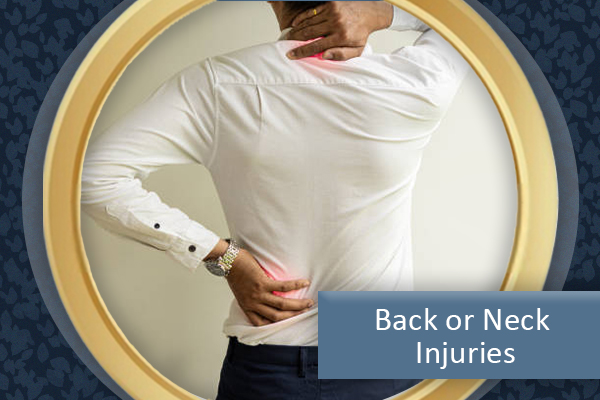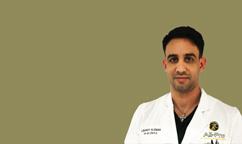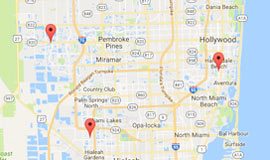Broken, Fractured or Cracked Ribs
 Your chest cavity contains vital organs and is protected by the bones of the rib cage. Your ribs are connected to each other by several layers of muscles which are critical for breathing.
Your chest cavity contains vital organs and is protected by the bones of the rib cage. Your ribs are connected to each other by several layers of muscles which are critical for breathing.
The ribs are also attached to the spine, which gives them added rigidity and strength. As strong as they are, ribs are prone to breaks and fractures due to traumatic injury.
However, it is not uncommon for people to have more than one broken rib at the same time or very severe cracked ribs.
Blunt trauma, such as from sports injuries or an automobile accident, are the most common causes of these kinds of more serious rib fractures.
Fortunately, here at All-Pro Orthopedics & Sports Medicine, we are well familiar with how to treat broken ribs, offering the most effective treatments that can get you back in the game!
Most Common Causes
A simple broken rib usually means that a person has a hairline fracture in one of the rib bones in the chest. In more complex fractures, the edges of the broken bone can be pushed out of place. In the case of a more serious rib fracture, the rib bone can tear into nearby internal organs, nerves, or blood vessels.
Broken ribs are most commonly caused by direct impacts, such as those that can occur from work-related injuries, motor vehicle accidents, or sports-related injuries.
Automobile Accidents – The most common cause of broken ribs is an auto accident, where the ribs are broken due to the blunt force trauma of the chest being slammed into the steering wheel. The high-velocity deployment of an airbag, though lifesaving, has also been known to break ribs.
Sports-Related Injuries – Broken ribs can occur from the blunt trauma that can occur in any contact sport, which increases the risk of trauma to your chests, such as hockey, rugby, or football. However, broken ribs can occur from falls during any kind of sports activity, and ribs can even be fractured by repetitive motion trauma from sports like golf and rowing.
Work-Related Injuries – Ribs can be injured or broken in any job that requires physical labor. Broken ribs are not uncommon among construction workers and warehouse workers due to falls or injuries from falling objects. But you do not have to be doing physical labor to break a rib on the job. Anyone can slip and fall and injure a rib, and believe it or not, ribs have even been broken as the result of a heavy cough!
Treatment Options
Most minor broken ribs heal on their own within six weeks. Unfortunately, unlike the bones in your hands, arms or legs, broken ribs can’t be set in a cast. Treatment aims to relieve pain while the injury heals.
When Do You Need to Seek Medical Help?
See your doctor if you have a very tender spot in your rib area that occurs after trauma, or if you have difficulty breathing or pain with deep breathing. Since the ribcage protects vital organs such as your heart and lungs, a severely broken rib could lead to a severe or even life-threatening injury. This risk increases with the number of broken ribs.
Seek medical attention immediately if you feel pressure, fullness or a squeezing pain in the center of your chest that lasts for more than a few minutes or pain that extends beyond your chest to your shoulder or arm. These symptoms can indicate a heart attack.
What Kind of Results Can I Expect From My Treatments?
The treatment of fractured or broken ribs will be tailored to the specifics of your injury, age, needs, and lifestyle. We will always strive to use the most effective treatments for your specific case, that will get you back in the game as soon as possible.
Choosing the right medical specialist after your traumatic sports injury is a crucial step in the rehabilitation process. As specialists in sports medicine, our physicians understand the nature of exercise and athletics-related injuries better than any other medical professionals.
We understand that as athletes or lay, sportsmen, you can’t afford to lose your edge. It is imperative that you sustain the full capabilities that you had before your sports-related injury, and it is always our goal to do so.
Contact All-Pro Orthopedics and Sports Medicine today for the quickest and safest recovery.
Common Questions about Broken Ribs Treatment and Fractured Ribs Treatment
How do I know if I have a broken rib or fractured rib?
You should see your doctor if you have a very tender spot in your ribs after trauma, or if you have difficulty breathing or pain when deep breathing. The ribcage protects vital organs like the heart and lungs. A severely broken rib can result in a life-threatening injury.
Once a patient comes to our clinic with pain, we perform a thorough physical examination and evaluation of their medical history. The doctor may order imaging tests such as x-rays, MRIs, or ultrasounds for proper diagnosis. It’s necessary to determine the cause of the pain before a treatment plan can be designed.
What’s included in your broken ribs or fractured ribs treatment?
Here at All-Pro Orthopedics & Sports Medicine in Florida, our doctors will work with you to develop a treatment plan best suited to your particular condition.
Healing and pain relief can be achieved by restricting activities and applying ice to the area regularly. Medications to provide pain relief are also important.
If you can’t breathe deeply, you may develop pneumonia. If oral medications don’t relieve your pain enough, your doctor may suggest injecting long-lasting anesthesia around the ribcage nerves.
In order to prevent pneumonia, your doctor may prescribe breathing exercises once your pain is under control.
What kinds of activities can I do with fractured or broken ribs?
If you have a broken rib (or ribs), simply resting will reduce some of the pain and also help your body heal.
In the recovery process, you will be able to get up and walk around pretty early, but it’s best to wait until your doctor says you’re good to go. During recovery, there are certain things you should not do, including playing contact sports, lifting anything over 10 pounds, and doing activities that require pushing, pulling, or stretching.














